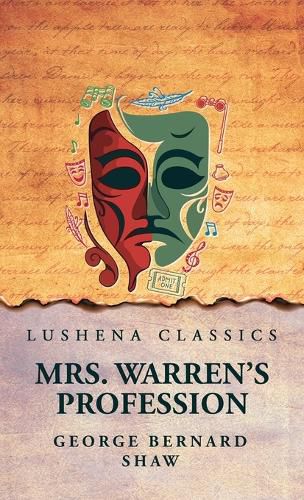Readings Newsletter
Become a Readings Member to make your shopping experience even easier.
Sign in or sign up for free!
You’re not far away from qualifying for FREE standard shipping within Australia
You’ve qualified for FREE standard shipping within Australia
The cart is loading…






This title is printed to order. This book may have been self-published. If so, we cannot guarantee the quality of the content. In the main most books will have gone through the editing process however some may not. We therefore suggest that you be aware of this before ordering this book. If in doubt check either the author or publisher’s details as we are unable to accept any returns unless they are faulty. Please contact us if you have any questions.
Mrs. Warren's Profession is a play by George Bernard Shaw, written in 1893 but first performed in 1902 due to its controversial subject matter. It critiques Victorian morality, gender roles, and economic exploitation, particularly in relation to prostitution and women's limited opportunities.
The play revolves around the strained relationship between Mrs. Kitty Warren, a former prostitute turned brothel owner, and her highly educated daughter, Vivie Warren.
Mrs. Warren is not a simple villain-she is a survivor who made difficult choices in a society that offered her little else. While she is pragmatic and emotionally vulnerable, she remains part of the corrupt system that she once escaped.
The play was banned from public performance in Britain for several years due to its frank discussion of prostitution and economic inequality. When it was finally staged in 1902, it scandalized audiences but also sparked important conversations about women's rights and labor conditions.
$9.00 standard shipping within Australia
FREE standard shipping within Australia for orders over $100.00
Express & International shipping calculated at checkout
Stock availability can be subject to change without notice. We recommend calling the shop or contacting our online team to check availability of low stock items. Please see our Shopping Online page for more details.
This title is printed to order. This book may have been self-published. If so, we cannot guarantee the quality of the content. In the main most books will have gone through the editing process however some may not. We therefore suggest that you be aware of this before ordering this book. If in doubt check either the author or publisher’s details as we are unable to accept any returns unless they are faulty. Please contact us if you have any questions.
Mrs. Warren's Profession is a play by George Bernard Shaw, written in 1893 but first performed in 1902 due to its controversial subject matter. It critiques Victorian morality, gender roles, and economic exploitation, particularly in relation to prostitution and women's limited opportunities.
The play revolves around the strained relationship between Mrs. Kitty Warren, a former prostitute turned brothel owner, and her highly educated daughter, Vivie Warren.
Mrs. Warren is not a simple villain-she is a survivor who made difficult choices in a society that offered her little else. While she is pragmatic and emotionally vulnerable, she remains part of the corrupt system that she once escaped.
The play was banned from public performance in Britain for several years due to its frank discussion of prostitution and economic inequality. When it was finally staged in 1902, it scandalized audiences but also sparked important conversations about women's rights and labor conditions.